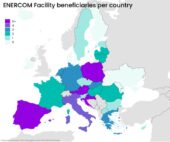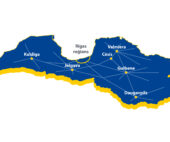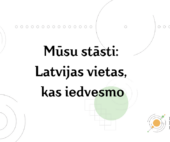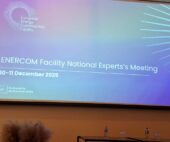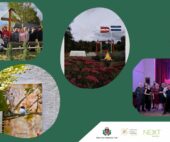RESOLUTION OF The 1st Latvian Rural Communities Parliament
On 7-8 June 2013, around 190 activists from rural communities and small towns all over Latvia gathered for the 1st Latvian Rural Communities Parliament that took place in Preiļi, Aglona, Līvāni, Riebiņi and Vārkava municipalities. Also present were representatives of Saeima (Parliament of Latvia), Ministry of Environmental Protection and Regional Development, Ministry of Agriculture and other state institutions together with representatives of local municipalities.
The aim of the 1st Latvian Rural Communities Parliament was, through dialogue between representatives of civic society and policy-makers, to identify particular actions that need to be done within next two years in order to promote sustainable development of communities in the rural areas and small towns of Latvia. Discussions during the Parliament, and during regional meetings which preceded it, identified the development needs of rural communities, on the basis of which the Parliament passed the following Resolution.
Participants in the 1st Latvian Rural Communities Parliament call upon the communities of rural settlements and small towns, the President of the Republic of Latvia, the Parliament of the Republic of Latvia, the Cabinet of Ministers, state institutions, non-governmental organisations, business institutions, social partners and active inhabitants of Latvia to support this resolution and to take action to implement it within the frame of their own resources and competences
The 1st Latvian Rural Communities Parliament – the initiative of Latvian Rural Forum – calls for the sustainable development of rural areas of Latvia, where in a balanced way are identified economic, social, civic and political activities that enrich human beings and nature, which are the main capital of our country. This resolution provides particular solutions to those challenges that are significant for rural communities in Latvia.
Depopulated countryside and lack of qualitative social capital in rural areas are serious challenges for the sustainable development of Latvia, even though many people choose rural areas as a space to live and to work. Those people are also complemented by the interest and initiatives of inhabitants who would like to move to the countryside. We should support such decisions by providing options. On all levels and in all possible ways, we should promote life and work in rural areas as a positive and modern praxis.
Thinking about necessary measures for sustainable development of communities in rural areas and small towns of Latvia, we stress the need to create a high-quality environment for life and work in rural areas : this goes far beyond a mere desire to survive. Rural areas and small towns of Latvia are very diverse in their character and in the challenges which they faces for community development. Therefore, solutions must be suited to each particular place, taking into account local resources and values : such solutions should be supported by national initiatives, including legislation, which motivate local communities towards action.
We call upon decision-makers, when planning investments and state budgets, to allocate sufficient resources to support the creation and diversification of possibilities for people, for life-long learning and for encouraging cooperation on solving practical issues at community and institutional level.
Communication is a significant cornerstone of sustainable community development in rural areas and small towns. It should be promoted by exchange of information and experiences, by learning, by agreeing on a common vision of the positive future of each place, and by making agreement on common actions in order to transform a “crowd of solitary people” into the “active team”
Our positive vision for the future is of rural areas and small towns of Latvia with active communities which:
– WORK (i.e. act in accordance with common understanding how to develop possibilities of local community and how to support each other);
– LOVE (i.e. do things that bring joy and satisfaction, and look for cooperation with those who are passionate about their activity, because this creates a positive spirit and motivation to create);
– TRUST and BELIEVE (i.e. trust in themselves, their partners and local inhabitants, and believe in their capabilities and resources);
– ARE CONSCIOUS ABOUT THEIR BASIC VALUES and build on their own life in a prosperous Latvia.
In order to promote sustainable development of rural communities there is a need to do following actions:
1. In order to build viable and diverse communities in the countryside and small towns of Latvia and to facilitate attraction of intangible resources for community development initiatives, it is necessary to:
1.1. Support community activists and leaders with educational opportunities and encourage their proficient action for community interests. Teach community leaders to use interactive methods such as citizen forums, “discussions on a couch” in the study of local people’s needs and to foster the identification and implementation of common actions(priority action for implementation on community level);
1.2. Practice a variety of life-long learning activities in community to acquire new competencies and skills at any age (community level);
1.3. Organise measures to build the self-confidence and self-action of inhabitants, including reducing their fear of making mistakes. Promote the use of alternative tools such as sport events, joint work and lunches to strengthen the social links in communities (community level);
1.4. Assemble good examples of donation, philanthropy, sponsorship and patronage in the community and in the same time to perform interpretative function, as well as promote creation of local community funds (community level);
1.5. Support and implement cooperation initiatives between different generations (community level);
1.6. Support young families – their development, life-skills learning and family values in general (community level, priority action for implementation on municipality level);
1.7. Identify and involve local residents in community initiatives, to discover their “hidden” capabilities for meaningful community development. Promote (inter alia) community resource mapping, establishment of local capacity/resources databases and a regular updating process (community level, municipality level);
1.8. Promote volunteering and complete the legal framework for volunteer work (community level, national level);
1.9. Use individual and professional community support to integrate unemployed persons back into the labour market (on all levels).
Effective communication and the exchange of the experience between the communities
2. In order to facilitate effective communication and to promote exchange of experience and cooperation between the communities in Latvia, it is necessary to :
2.1. Develop diverse communication channels for the local population (meetings, social networks, „spoken word”) and create pro-active contact network in communities (community level);
2.2. Build an available public database with successful partnership examples (NGO’s, local government, businesses) of solving issues of local development, and of case studies from formal and non-formal initiative groups in Latvia (community level , regional level);
2.3. Develop co-operation programmes for NGO’s and interest groups at municipal level (municipality level);
2.4. Support projects for strengthening cooperation between communities (community level, priority action for implementation in national level);
2.5. Create a national network of community/NGO coordinators in Latvia, in order to facilitate exchange of their experience and improve their competence on issues of the local development (community level, national level);
2.6. Provide regular research about NGO sector and civil society in Latvia (national level).
Active involvement, participation and co-responsibility of communities
3. To promote active community involvement and participation in decision-making processes, as well as to encourage active participation and co-responsibility on community development issues, it is necessary to:
3.1. Promote social networking with respect to the diversity of different social groups (individual approach to youth, seniors etc.), in order to create a common community voice in the dialogue with local government (community level);
3.2. Promote among communities the concept of self-defined development goals, explain the benefits of joint implementation of ideas, shared initiatives and active dialogue with local government (community level);
3.3. Promote more active delegation of tasks (with proper resources) to the NGO sector (municipality level);
3.4. Support meaningful forms of involvement of NGOs in the management of municipality and decision-making (inhabitants’ councils) (community level);
3.5. Promote partnership between local communities, local government and national government (exchange of experience, volunteer days and campaigns). Encourage public servants to be open and flexible in cooperation with community representatives (national level).
The positive image and attractiveness of rural areas to the susceptible people
4. In order to build a positive image and attractiveness of rural areas to susceptible people, it is necessary to:
4.1. Promote awareness within communities of the value of their area, and foster the identification of citizens with their area. Support initiatives which promote a sense of belonging and preservation (community level);
4.2. Identify and preserve traditions of each area, and create new traditions that can be related with business(community level);
4.3. Promote creation of new workplaces and opportunities for business activity outside big cities. For example, organise a campaign to highlight community resources and the openness of communities to business and employment (community level, municipality level);
4.4. Launch a publicity programme e.g. „Mission Possible for Life and Work in the Countryside” (community level, national level);
4.5. Promote a campaign which highlights rural space and its high value for community life (national level).
Land and other necessary resources to live and work
5. To favour holding land and other resources within community and facilitating access to such resources for life and work in rural areas, it is necessary to:
5.1. Strengthen public awareness about the land and other natural resources as significant assets for development (also in a global context) (community level, national level);
5.2. Support newcomers (people who move from urban to rural areas) in the countryside with available municipal and state land and housing stock for business development (municipality level, national level);
5.3. Create a State Land Fund (national level);
5.4. Implement a national programme of grants or other support for people to move to rural areas and to start work or entrepreneurship activity (national level);
5.5. Facilitate sustainable management and effective use of land resources (on all levels).
Public recognition and support to local products and entrepreneurs
6. To increase public recognition of local products and entrepreneurs, to contribute the development of local economies and local values and to ensure sufficient financial resources for business start-ups, it is necessary to:
6.1. Inform and educate society about the benefits of consuming local products and the added value which is thereby retained within the local community (all levels);
6.2. Promote local producers and their products by developing short supply chains, organising local markets, developing support systems for recognition of local products, popularising local products and producers on websites of municipalities and other territorially linked organizations (all levels);
6.3. Organise events to promote consumption of local biological products (education of consumers, regulation to create economic benefits for local consumption) (all levels);
6.4. Encourage development of social entrepreneurship to facilitate the creation of local resources and values in community (all levels);
6.5. Promote establishment of local credit-savings societies and co-operative societies, especially paying attention to the active participation of local governments during creation of ideas and developmental processes (all levels);
6.6. Facilitate understanding of the importance of creative economy in today’s regional development, and of the benefits that Information and Communication Technologies can bring to workers in more isolated areas (all levels);
6.7. Give local governments the ability to co-finance the development of entrepreneurship initiatives (competitions, awards, competitions of ideas, consultancy) and to facilitate the development of business infrastructure in small towns and rural areas (municipality level, national level);
6.8. Introduce tax allowances for the first years of entrepreneurship, especially in territories without beneficial advantages for business start-ups (municipality level, national level);
6.9. Implement national financing programmes to facilitate business start-ups, including risk capital and seed funding which are often denied by banks (national level);
6.10. Facilitate the availability of public financial tools for business development, abolishing additional limits (such as co-financing rate) (national level);
6.11. Reduce the administrative burden for entrepreneurs by optimising the work process of the controlling institutions (one-stop-shop principle), giving greater attention to consultancy and training in moving their processes towards new and emerging entrepreneurs (national level).
Financing development initiatives
7. To facilitate the activities for attracting the financing for development initiatives, it is necessary to:
7.1. Enhance understanding that public funding must be invested in the infrastructure, based on society’s needs, without additional burdens of maintenance, and supplemented by community initiatives (municipality level);
7.2. Review the definition of ‘rural areas’ in cooperation with local authorities : in particular, the support system for rural projects should be adapted to pay attention to smaller areas outside the centres of local authorities.
7.3. Ensure that LEADER groups are enabled to use EU funding for small scale infrastructures, activities and administration costs (national level).
Lifelong learning
8. To promote lifelong learning processes in the community, it is necessary to:
8.1. Provide activities for inhabitants (especially children and youth) where they can discover different professions and “try” them (community level);
8.2. Use local schools as the base for creating workshops to provide training in various skills (community level, municipality level);
8.3. Provide each municipality with professional leaders of result-oriented lifelong learning (could be also linked with community coordinators and/or consultants) (municipality level);
8.4. Promote preservation of the high-quality network of vocational schools in rural regions (municipality level, national level);
8.5. Implement a national programme for school teachers participating in the lifelong learning of communities (national level);
8.6. Encourage pupils to choose vocational education (all levels).
The conducive role of local governments in the community development
9. To strengthen the conducive role of municipalities in promotion of sustainable community development in rural areas and small towns, it is necessary to:
9.1. Provide funding in municipality budgets for inhabitants’ initiatives (for example through small project competitions) as well as for co-financing community projects (municipality level);
9.2. Facilitate access and use of municipal premises by different community groups for activities of public benefit. In cooperation with community representatives, look for solutions for the use of „empty buildings” (municipality level);
9.3. Develop cooperation practice where municipal buildings are managed by NGOs (municipality level);
9.4. Ensure availability of the following experts beyond the centres of municipalities: youth coordinators, business experts, lawyers (municipality level);
9.5. In cooperation with community centres, create a network of one-stop-shop agencies (municipality level);
9.6. Present information about public hearings to all people in all accessible ways (municipality level)


